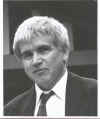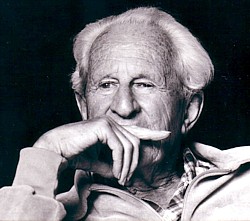Mike Davis Bio
Davis, Mike (b. 1946) ,
writer, historian, activist, resides in Los Angeles
,
writer, historian, activist, resides in Los Angeles
- detailed biography: Adam Schatz, "The American
Earthquake: Mike Davis and the politics of disaster,"
in: Lingua Franca, Sept. 1997, republished
on Radical Urban Theory:
In 1969, after being fired by Dorothy Healey, the regional
party leader, for hounding the Russian cultural attaché out of the
store--Davis despised the Soviets and didn't like them snooping around--he
enrolled in a teamsters' opportunity program. For the next four years,
he hauled 240-foot trailers filled with Barbie dolls out of L.A., acquiring
an encyclopedic knowledge of the city as well as of Western geography.
In his spare time, he tried to master Marx's Capital and Sartre's Search
for a Method and paid visits to Herbert Marcuse. Fellow
left-wing truckers were rather hard to come by. "At night we'd go
out to topless bars, and I'd blurt out, 'I'm a communist,' and they'd say,
'Dick's a Jehovah's Witness. Let's have another drink.'"
- In a 1990s interview with Mark Dery, "Downsizing the Future: Beyond
Blade Runner with Mike Davis," probably published in Dery's Escape
Velocity (Grove 1997) [$1
used at amazon], and on
Dery's website (alternate link):
"You know, I don't
really know what postmodernism is; I do know that we live in a post-liberal,
post-reformist period where substantive urban reform has been abandoned
and where the liberal positions of the '60s now stand in almost revolutionary
relationship to political discourse in this country. What's being recycled
as postmodernism is Frankfurt School Marxism in its most pessimistic mode,
although admittedly jazzed up with some very interesting thoughts about
new technologies and media. But Marcuse's One-Dimensional Man
still squats on the horizon, shaping the argument; the 'postmodern' disappearance
of the critical subjectivity is pure Marcuse.
...
Davis: Of course, although I should point out that the malling of public
space doesn't have this kind of Marcuse-ian determinacy,
where the critical consciousness or the rebellious subject is extinguished
in the sweet plunder of intoxicated consumption. Rather, what actually
happens is the definition of new forms of criminality, to the extent that
the social spaces that people--- particularly kids---use are now these
pseudo-public spaces, malls and their equivalents. Increasingly, the only
legal youthful activities involve consumption, which just forces whole
areas of normal teenage behavior off into the margins."
- author of (additional texts available on Radical
Urban Theory website):
- Prisoners of the American Dream: Politics and
economy in the history of the US working class
(London: Verso, 1986)
- ed: The Year Left 2: An American Socialist Yearbook
(London: Verso, 1987)
- and Michael Sprinker (eds.), Reshaping the US left
: popular struggles in the 1980s (London: Verso, 1988)
- et al, ed: Fire in the hearth: the radical politics
of place in America (London: Verso, 1990)
- City of Quartz: Excavating the Future in Los Angeles
(Verso, Vintage, 1990)
- LA was just the beginning: Urban revolt in the
United States: a thousand points of light (Open magazine pamphlet
series, no. 20); (PO Box 2726, Westfield NJ 07091), 20 pages
- Beyond Blade Runner: Urban Control, The Ecology
of Fear (full
text at MediaMatic)
(Open magazine pamphlet series, no. 23); (PO Box 2726, Westfield NJ
07091), 20 pages
- Ecology of fear: Los Angeles and the imagination
of disaster (New York : Metropolitan Books, 1998)
- Prisoners of the American dream: politics and economy
in the history of the US working class (Verso, 1999)
- video, in America behind Bars series: Beyond the
prison industrial complex [videorecording]: critical resistance /
[presented by] Deep Dish T.V.
Publisher San Francisco, Calif. : Critical Resistance Video : Public Media
Network [distributor], [1999?] Description 1 videocassette (56 min.)[highlights
from 1998 Berkeley conf.]
- Magical urbanism: Latinos reinvent the US city
(New York : Verso, 2000)
- Late Victorian holocausts : El Nin~o famines and
the making of the third world (New York: Verso, 2001)
- Dead cities, and other tales (New York: New
Press; Distributed by W.W. Norton, 2002)
- Land of the lost mammoths: a science adventure
(Santa Monica, CA: Perceval Press, 2003)
- Under the perfect sun : the San Diego tourists
never see (New York: New Press; distributed by W.W. Norton, 2003)
- "Planet
of Slums," in New Left Review (March-April 2004): "Future
history of the Third World's post-industrial megacities. A billion-strong
global proletariat ejected from the formal economy, with Islam and Pentecostalism
as songs of the dispossessed."
- The Monster at Our Door: The Global Threat of Avian
Flu (New Press, 2005)
- "Planet of Slums: Urban Involution and the Informal
Proletariat"
- Readings from Marcuse and Davis are included in the University
of Warwick course "Explorations in Critical Theory and Cultural
Studies," 2005-06.
- Margit Mayer used texts by Davis and Peter Marcuse in a 2002 Berlin
course: "New
York City and Los Angeles: Contrasting Politics in the Global City."
- Nov.
1998 LA Weekly biography

 ,
writer, historian, activist, resides in Los Angeles
,
writer, historian, activist, resides in Los Angeles